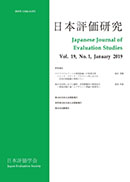
- Issue 3 Pages 1-
- Issue 2 Pages 1-
- Issue 1 Pages 1-
- |<
- <
- 1
- >
- >|
-
―A Case of SHG program in Madhya Pradesh State, India―Mio Takada2019Volume 19Issue 1 Pages 1-18
Published: January 15, 2019
Released on J-STAGE: June 01, 2023
JOURNAL FREE ACCESSWith the recent remarkable expansion of Micro Credit programs (MC), the literature of the impact evaluation has been rapidly growing which assesse its effectiveness in the poverty alleviation. However, it is difficult to conclude that the exiting literature has reached a consensus on the effectiveness of MC.
The purpose of this paper is to empirically assess whether the MC program has been effective among the poor people, and if it is effective, what kind of pathway has been followed. The paper uses the case of the Self-Help Group (SHG) Program in Madhya Pradesh, India, and it employs a quasi-experimental method by combining propensity score matching and difference-in-difference analysis.
The results confirm that the MC program has significant effects in economic and social dimension. Furthermore, the sub-sample analysis indicates that MC enables the poor households to change their financial behaviors, such as practicing regular saving and opening individual bank accounts.
View full abstractDownload PDF (2178K) -
―Importance of assessment of design and theory―Takayasu Yuasa2019Volume 19Issue 1 Pages 19-34
Published: January 15, 2019
Released on J-STAGE: June 01, 2023
JOURNAL FREE ACCESSThe Japanese government will amend the Local Public Service Act and the Local Autonomy Law on April 1, 2020. In this revision, the local government will reconfirm the appointment system of part-time staff, adjust the number of posts and types, apply work regulations, and improve the allowance and salary. However, because the government’s control over local governments and the discretion of local governments are ambiguous, this amendment will create new problems. Also, because local governments are short of financial resources, part-time staff may be at risk of reducing post-employment ‘yatoi-dome’, not re-hiring. Full-time staff will increase the burden on personnel evaluation subjects, which will have an adverse effect on “reform of workers”. Therefore, before the government changes the civil servant system, it is necessary to evaluate the new personnel policy in advance, carefully assessing necessity and effectiveness.
View full abstractDownload PDF (1106K)
- |<
- <
- 1
- >
- >|